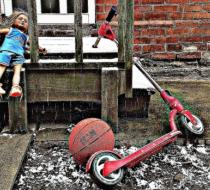All in the Family Parts 1 & 2 Favorite
The link between early trauma and ill health later was untilled soil in the world of medicine. But the possibility of a connection captured the interest of the Centres for Disease Control and Prevention. And it was the beginning of a 25-year odyssey for Vincent Felitti when he teamed up with researchers to study the health of 17,000 members of a preventive care program at Kaiser Permanente, a private insurer. Beyond routine physicals, workers (mostly middle-class and middle-aged) filled out an extensive trauma questionnaire covering ten categories of abuse, from physical violence to attempted suicide. Past and present health problems were also tabulated. The results were astonishing.
The more categories of abuse that participants suffered, the higher their chances of illness were. For example, women who experienced physical violence were 60% more likely to experience depression, compared to 18% for women who reported no categories of abuse. The figures for attempted suicide were even more startling. Only 2% of those who reported no categories of abuse attempted suicide. However, those who reported four or more categories were breathtakingly 1,200% likelier to attempt killing themselves.
Similar results for smoking, cancer, diabetes, among other diseases, followed the same pattern. Today, the Adverse Childhood Experiences (ACE) Study has become a fixture in the fields of medicine, psychiatry and pediatrics. Six state legislatures in the U.S. have passed legislation to stimulate the routine collection of data on childhood trauma. And now, the World Health Organization also uses the ACE model to explore global health.
"Cardio-vascular disease. Obesity. Alcoholism. Diabetes may have one surprising factor in common: childhood trauma -- according to a massive study called "Adverse Childhood Experiences", or ACE. In part one of this series, a version of which was first broadcast in 2011, IDEAS producer Mary O'Connell explores the ACE study and how its findings are being integrated into medical practice today. Part 2 airs Thursday, April 14; Part 3 airs Thursday, April 21.Truancy. Drug use. Failing grades. Academic failure has often been explained as a function of poverty, class, even poor nutrition. But now, childhood trauma is increasingly being seen as a major factor in academic under-achievement. IDEAS producer Mary O'Connell explores what happened at one high school when suspensions and punishments were replaced with new "trauma-informed" approaches. Part 3 airs Thursday, April 21.






